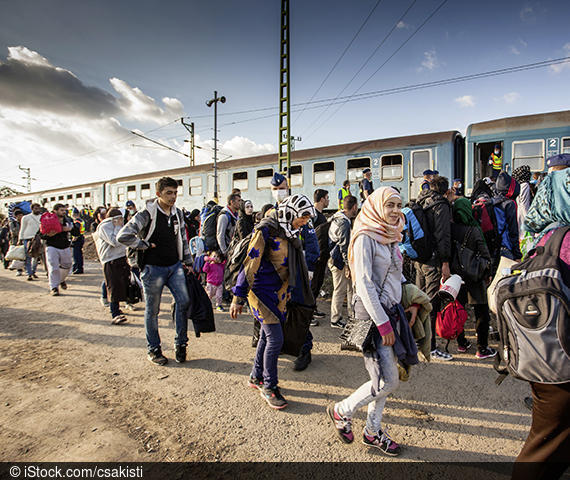Hate Crimes Against Asylum Seekers Occur Predominantly in Regions with Little Immigration Experience
ResearchHate crime in Germany has increased significantly in the wake of the large influx of asylum seekers in the past years. Some regions have, however, seen a far greater increase in hate crimes against asylum seekers than others. This rise in hate crime is, however, not only driven by the number of refugees moving to a specific region. Regions that saw the arrival of a great number of asylum seekers and that previously had only a low share of foreign-born inhabitants have experienced the highest increase. What is more, the probability of becoming a victim of hate crime in East Germany is ten times greater than in West Germany. This is the result of a study conducted by the ZEW – Leibniz Centre for European Economic Research in Mannheim, in cooperation with researchers from the Goethe University Frankfurt.
Hate crimes are politically motivated criminal acts, which are based on prejudice against and rejection of other social groups. The scientists have been investigating attacks directed against refugee shelters as well as the people living in them. These crimes include hate speech, swastika graffiti, physical assaults and arson. In the study, the researchers investigated whether the scale and the regional distribution of the influx of asylum seekers has an effect on the number of hate crimes against this migration group, and determined the factors that have an additional impact on the incidence of hate crime. The study is based on data on hate crimes against asylum seekers reported to police departments in the period between 2013 and 2015.
The results of the study show that there is no correlation between the mere number of refugees and hate crimes recorded in a specific county, meaning that counties that experienced a great influx of refugees did not record more hate crimes per capita than regions which received only few asylum seekers. According to the study, the rise in hate crime is primarily attributable to regional differences. In this context, the researchers investigated whether other factors – namely the share of immigrants already living in a particular county, the economic situation of a specific region and the incidence of hate crimes committed during the 1990s – can explain the differences that continue to exist between German regions.
As the study shows, the presence of foreign-born residents at the local level plays the most significant role. The number of attacks against asylum seekers is much greater in regions that had only a small share of foreign-born individuals before the influx of refugees than regions with an already high share of foreign citizens. “Whether or not hate crime against refugees occurs depends primarily on how much experience a region has with immigration,” explains Martin Lange, a researcher in the ZEW Research Department “Labour Markets and Human Resources” and author of the study.
Hate crimes against asylum seekers are not motivated by economic factors
When crime rates are compared across all German states, it becomes evident that the number of incidents is much greater in East German regions. East German counties with a share of foreign-born individuals of three per cent, and which receive 1,000 refugees per 100,000 local residents, experience, on average, two to three hate crimes per year. In a comparable county in West Germany, this figure ranges between 0.4 to 0.6 incidents.
In addition, the researchers found evidence that hate crimes against asylum seekers are more likely to occur in regions that had already experienced criminal acts directed against immigrants 25 years ago. “The increase in hate crime is also linked to xenophobic attitudes that had already existed in the respective regions and which now seem to have become entrenched,” says Martin Lange. “In some cases, a small number of asylum seekers moving to a particular region is already enough to trigger a rise in hate crime.”
Local economic conditions play only a minor role in this phenomenon. “Hate crimes against immigrants are not primarily motivated by economic factors. It is therefore important for policymakers to cultivate awareness and compassion when allocating asylum seekers to regions with little immigration experience,” concludes Martin Lange.
For more information please contact
Martin Lange, Phone +49 (0)621-1235-156, E-mail martin.lange@zew.de

